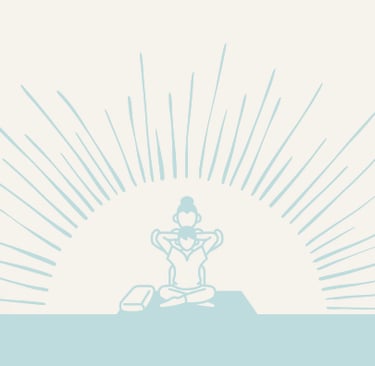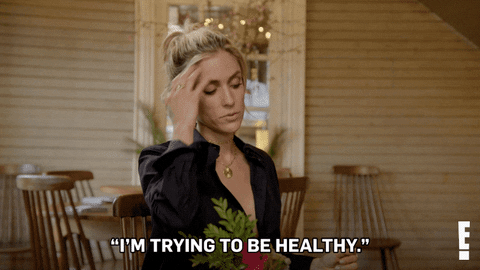

Why Holistic Health Needs Science
Back when I started studying public health and began dipping my toes into the world of alternative medicine, I used to roll my eyes at the whole concept.
It felt like something straight out of a wellness retreat, where people swore by moon water and energy cleanses instead of, you know, actual medicine. However, the more I learned, the more I realized that real holistic health is finding what actually helps and making it a part of your everyday life in a way that feels effortless.
Holistic health, when done right, isn't about replacing antibiotics with essential oils or swapping real therapy for "positive vibes."
It’s about recognizing that health is more than just treating symptoms—it’s about addressing the whole picture: mind, body, lifestyle, and environment.
And surprisingly?
A lot of it is backed by solid research. So let’s cut through the nonsense and talk about what actually makes a difference—no magic potions, just science-backed wellness that stands the test of time.
💡 Things to take with you
True holistic wellness is about looking at the bigger picture of health—addressing the mind, body, lifestyle, and environment together, rather than just treating symptoms.
Many holistic practices are supported by peer-reviewed research, proving their effectiveness when integrated correctly.
Research indicates that mindfulness-based stress reduction (MBSR) can be as effective as prescription antidepressants for anxiety.
Acupuncture is recognized by the American College of Physicians as a valid complementary treatment for chronic pain.
That’s why it’s so important to approach holistic health with curiosity and a critical eye.
It’s about asking, “Does this actually work for me, and is there evidence behind it?”
When we combine ancient practices with modern research, we get the best of both worlds: care that feels personal, grounded, and effective.
Holistic health doesn’t have to be woo-woo—it can be smart, intentional, and real.


Science-Backed Holistic Practices (No Pseudoscience Required)
So, what are some holistic practices that actually hold up under scientific scrutiny? Let's break down a few that are not just trendy, but truly effective—grounded in research, not hype.
1. Mindfulness and Meditation
What the Science Says:
Meditation isn't just a "good vibes" practice—it's a neuroscience-backed tool for reducing stress and improving mental clarity. A 2022 study published in JAMA Psychiatry: found that mindfulness-based stress reduction (MBSR) was as effective as escitalopram, a commonly prescribed antidepressant, for treating anxiety disorders.
Another more recent 2023 study explored the effectiveness of digital meditation interventions in reducing employee stress. Participants who engaged in digital meditation showed significant improvements in stress levels after eight weeks.
How It Works:
Meditation helps regulate the amygdala (your brain’s fear center) and reduces cortisol levels, which can improve mood, focus, and even physical health. Digital meditation tools make this practice even more accessible by offering guided sessions and real-time biofeedback.
Worth Trying?
Absolutely—especially for managing stress, boosting focus, and building emotional resilience. Digital meditation apps may be a great alternative for those who struggle with consistency or need structure in their practice.


2. Acupuncture and Chronic Pain Relief
What the Science Says:
While comprehensive meta-analyses are ongoing, existing studies suggest that acupuncture may help reduce chronic pain, particularly for conditions like osteoarthritis and migraines.
For instance, a review article in The New England Journal of Medicine discusses various complementary therapies, including acupuncture, for chronic pain management.
💡 Complementary therapies such as acupuncture and massage are recommended by the American College of Physicians for chronic low back pain.
How It Works: Acupuncture stimulates the nervous system, releasing endorphins and promoting blood circulation to targeted areas.
Worth Trying? If you suffer from chronic pain, it's a solid, low-risk option backed by clinical studies.
Curious about acupuncture but not into needles? The acupressure mat and pillow set (full body pro kit) has been my go-to for melting away stress and muscle tension. It’s honestly such an easy way to relax after a long day — just a few minutes on it and you’ll feel the difference.
It’s honestly such an easy way to relax after a long day (just a few minutes on it and you’ll feel the difference).


3. Gut Health & Probiotics
What the Science Says:
Your gut—the powerhouse of digestion, immunity, and even mood regulation!
A 2023 Harvard Health report found that probiotics can help with digestion, immune function, and even mental health via the gut-brain axis:
"The gut has been called a "second brain" because it produces many of the same neurotransmitters as the brain does, like serotonin, dopamine, and gamma-aminobutyric acid, all of which play a key role in regulating mood. In fact, it is estimated that 90% of serotonin is made in the digestive tract."
How It Works:
Your gut microbiome is like a thriving ecosystem that influences everything from metabolism to mental clarity. Feeding it with prebiotics (fiber) and probiotics (good bacteria) can help improve digestion, strengthen immunity, and even lower stress levels.
The purely inspired organic green powder smoothie mix (unflavored, 24 Servings) is packed with probiotics, spirulina, and chlorella to support digestion and gut health. It blends perfectly into smoothies, juices, or even just water.
Worth Trying?
Yes, but focus on whole foods (fermented foods, fiber-rich diets) before shelling out for expensive supplements. Start with real, fermented foods—think yogurt, kimchi, and sauerkraut—before considering a supplement. Whole foods often give you the biggest bang for your buck.


4. Herbal Medicine (the Evidence-Based Kind)
What the Science Says:
Herbal medicine isn’t just ancient folklore—some herbs have real clinical backing.
For example, a 2023 Mayo Clinic review found that ashwagandha effectively reduces stress and cortisol levels.
Rhodiola rosea, another adaptogenic herb, has been studied for its effects on fatigue and cognitive function. Clinical trials have demonstrated that Rhodiola supplementation can reduce symptoms of fatigue and improve mental performance under stressful conditions.
How It Works:
Adaptogens like ashwagandha and rhodiola help modulate stress responses, while others (like ginger and turmeric) have proven anti-inflammatory properties.
Ginger contains bioactive compounds like 6-gingerol that can inhibit pathways that lead to chronic inflammation, potentially benefiting conditions such as osteoarthritis.
Turmeric's active ingredient is curcumin that can reduce inflammation and may alleviate symptoms associated with arthritis and other inflammatory conditions.
Worth Trying?
Some herbs are well-researched and have real health benefits, but always check for clinical studies before believing the hype.
How I use it:
Fresh ginger slices in hot water with a squeeze of lemon and a dash of honey. Instant comfort.
Lately, I’ve been trying to swap my afternoon coffee for something that actually helps with stress and the superadapt stress suppress herbal tea from The Republic of Tea has been a win:
It combines tulsi and rhodiola to support your body’s natural stress response. No caffeine, no crash, just calm focus and a gentle mood lift.


5. Breathwork and Stress Reduction
What the Science Says:
Incorporating controlled breathing techniques like box breathing and diaphragmatic breathing into your daily routine can be a simple yet effective way to manage stress and improve overall well-being.
These practices are free, easy to learn, and backed by scientific research.
For instance, a study published in Cell Reports Medicine found that daily 5-minute breathwork exercises, especially those focusing on prolonged exhalations, significantly improved mood and reduced respiratory rate.
Another review highlighted the clinical utility of breathwork interventions in reducing anxiety symptoms among adults diagnosed with anxiety disorders.
Additionally, a study published in Harvard Health showed that slow, intentional breathwork can trigger the relaxation response, reducing anxiety and promoting mental clarity.
How It Works:
Breathwork activates the parasympathetic nervous system (your "rest and digest" mode), which counters the fight-or-flight response.
Techniques like 4-7-8 breathing or coherent breathing help regulate heart rate, improve oxygenation, and lower cortisol levels—basically, it's a natural way to calm your system down.
If you ever catch yourself holding your breath when stressed, the 528 Hz Breathing Necklace is a gentle reminder to slow down. It’s more than just jewelry, it’s a mindful tool for relaxation, combining breathwork, aromatherapy and sound frequency therapy to bring calm back into your body.
Whether you’re managing anxiety, struggling with focus, or just need a moment to reset, breathwork is a tool worth adding to your routine. Plus, apps like Breathwrk, Pranayama, or The Wim Hof Method can guide you through different techniques if you're new to the practice.
How to Integrate Holistic Health (Without the Nonsense)
You don’t need to overhaul your life or fall for expensive trends to feel better. If you’re skeptical about holistic health but still want to optimize your well-being, here’s how to do it without the woo-woo:
🔎 Key insights
Start Small:
Forget trying to revamp your entire routine overnight. Pick one evidence-backed practice to incorporate, like five minutes of meditation or adding more fermented foods to your diet. Tiny tweaks add up.Go for Science-Backed Solutions:
Before you drop cash on the latest wellness craze, check PubMed, Harvard Health, or JAMA Network to see if there’s any real science behind it—or if it’s just clever marketing.Listen to Your Body & Mind:
Just because something is trending doesn’t mean it’s right for you. Wellness isn’t about trends—it’s about what makes you feel and function better.Combine, Don’t Replace:
Holistic health isn’t about rejecting medicine—it’s about enhancing it. Use what works, and leave the rest.
True wellness doesn’t come from extremes—it comes from thoughtful choices that respect both science and your individuality. You don’t have to believe in every trend to take care of yourself. Start where you are, stay informed, and focus on what genuinely makes you feel good inside and out.


Conclusion: Real Wellness, No Gimmicks
Holistic health doesn’t have to mean falling for overpriced and unproven trends.
Holistic health isn’t about replacing your doctor with a crystal collection.
When you strip away the pseudoscience, what’s left is a collection of powerful, research-backed practices that can actually enhance your health.
Breathe deeper, stress less, feed your gut, and give your mind the same care you’d give your body.
No, you don’t need $50 green juices or moon-charged crystals to feel better.
Think of it like upgrading your life’s operating system—small tweaks, big performance boosts. No need for a full reboot, just start where you are. Real wellness isn’t about what looks good on social media—it’s about what helps you function at your best, long-term.
--
Disclaimer: The information provided on the blog is for general informational and educational purposes only and is not a substitute for professional medical advice, diagnosis, or treatment. Consult with a qualified healthcare provider before making any health-related decisions
Disclosure: Some of the links here are amazon affiliate links which simply means if you choose to buy through them, I may earn a small thank-you commission. It helps keep Demure Wink ad-free and focused on mindful, research-based content I love creating for you.
